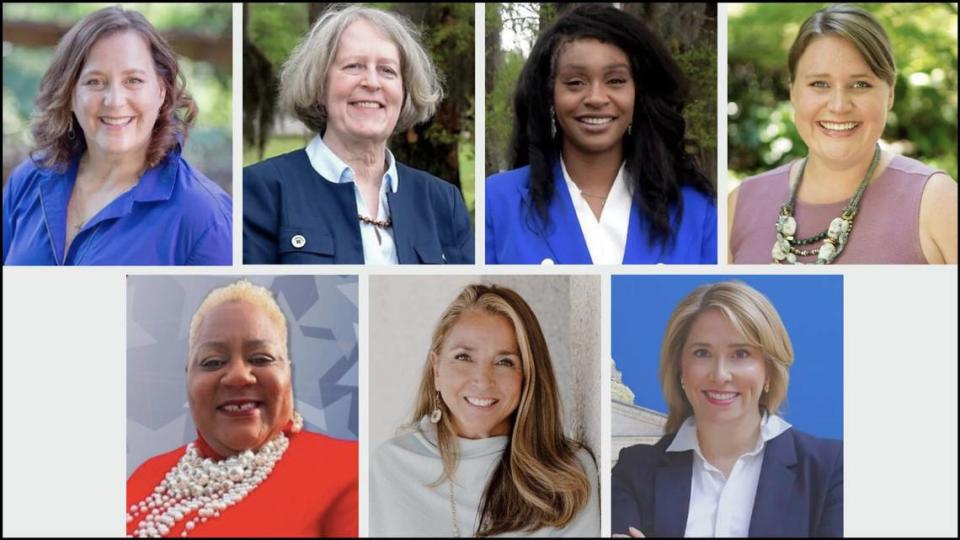‘Women are fired up’: Beaufort County Democratic ticket aims to unseat GOP incumbents
The Beaufort County Democratic Party is fielding a slate of female candidates, many of whom are new to politics, in an effort to loosen the grip of longtime Republican incumbents in the South Carolina House and Senate.
Putting so many woman on the Democratic ticket was not an intentional choice, said Kathleen Hughes, chairwoman of the Beaufort County Democratic Party.
“It just happened organically that women are fired up and have chosen to step up and run,” she explained. “They are invested in making a difference in this election.”
More than 55% of registered voters in South Carolina are women, Hughes said, adding that both Republican and Democratic voters are upset with the choices members of the Statehouse have made and are ready to speak up about it.
As they campaign, the Democratic candidates will be making appeals to women across the political aisle.
“Reproductive rights is a key issue. It’s an issue that affects every woman in the nation, including South Carolinians, but there are other issues coming from the Statehouse that affect our population as well,” Hughes said.
She cited the recent passage of a “Constitutional Carry” bill that Gov. Henry McMaster signed into law March 7. It allows anyone older than 18 to openly carry a gun without a permit in South Carolina.
“A lot of South Carolinians feel (the open carry law) is making our state less safe,” Hughes said. “It’s an issue that affects women and families.”
A report last year by the nonpartisan She Should Run estimated that just over 22% of adult women in the United States could be interested in seeking elected office to increase women’s representation in government. The issues motivating them have to do with the economy, climate change, reproductive health, racism and gun violence.
Women are most likely to take action on issues related to children, health, education and poverty, the report says.
“The generally accepted judgment about women today is that they are motivated by gender equality as a standalone issue for seeking change. In reality, women are motivated by the everyday ‘kitchen table’ issues that show up in their lives,” the report says.
Beaufort and Jasper counties
Among the non-incumbent female candidates on South Carolina Democrats’ legislative ticket:
Julie Hussey is challenging Sen. Chip Campsen in Senate District 43.
Gwyneth Saunders is challenging Sen. Tom Davis in Senate District 46.
Charity Owens is challenging Rep. Bill Herbkersman in House District 118.
Kate Creech is challenging Rep. Weston Newton in House District 120.
Audrey Hopkins-Williams is challenging Rep. Bill Hager in District 122. First, however Hopkins-Williams will face fellow Democrat Johnny Lee Jackson Jr. in the primary June 11.
Lisette Cifaldi is challenging Rep. Jeff Bradley in House District 123.
Melinda Henrickson is challenging Rep. Shannon Erickson in House District 124. This is the only one of the seven races that will see two women vie for the same seat.

Democratic Sen. Margie Bright Matthews of District 45 is running for re-election.
Bright Matthews is one of the five female state senators honored last fall with a Profile in Courage Award by The John F. Kennedy Library Foundation for sticking together in the fight against a near-total abortion ban in South Carolina. Three of the other four known as the “Sister Senators” are Republicans, and one is independent.
Since then, they have been joined by a sixth female senator. Democrat Tameika Isaac Devine was the winner of a special election in January to fill the seat left open by the death of Sen. John Scott in Ridgeland County’s District 19.
There are 46 senators total in South Carolina’s Senate. Of the 124 representatives in South Carolina’s House, 21 are are women, including Erickson, a Republican from Beaufort.
The Center for American Women and Politics at Rutgers University has tracked mostly steady increases in the number and percentage of women elected to legislatures across the nation since 1980, with a particular surge since 2019.
Researchers there said South Carolina ranks fourth from the bottom on a list of the percentage of female state legislators (15.9%). West Virginia had the lowest percentage at 11.9%, and Nevada had the highest at 60.3%.


